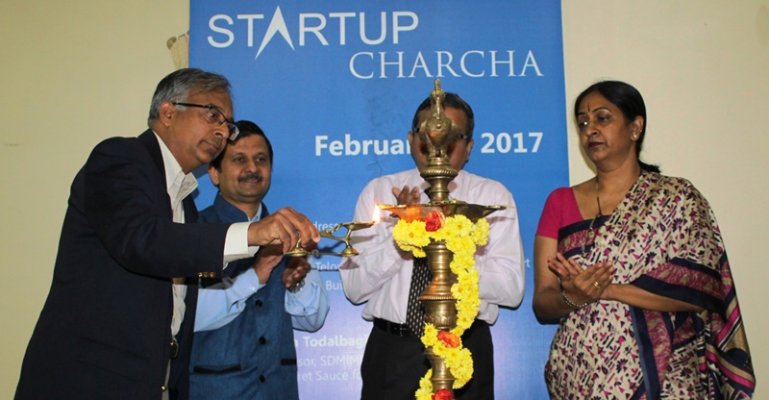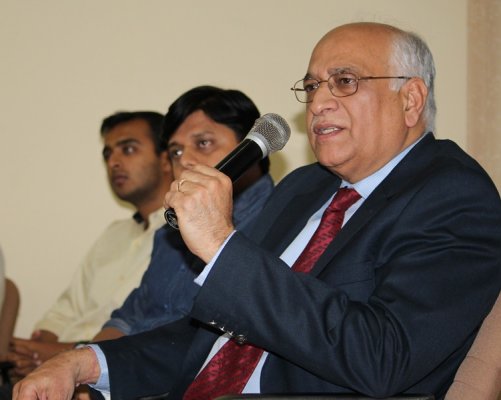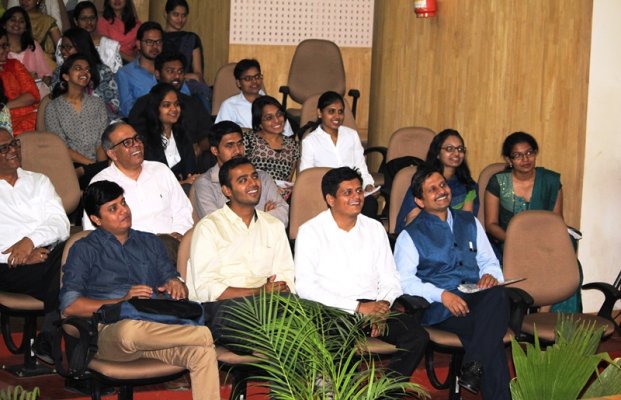Startup Charcha 2017
   |
|
|
SDMIMD conducted the event Startup Charcha on Feb 9, 2017. This event is a culmination of various entrepreneurship activities undertaken by Swayam - E cell of SDMIMD students. It is also an event that is in line with the current surge in interest on startups and the conducive policy environment for the same. SDMIMD had initiated entrepreneurship activities to give conceptual insights to PGDM students on Entrepreneurship. Swayam – E cell of SDMIMD students has undertaken many activities in the last four years. An elective on Entrepreneurship has also been part of the PGDM program at SDMIMD.
The Startup Charcha event held for the second year in succession had Mr Aroon Raman, Managing Director, Telos Investments and Technologies (also the author of best-selling books) delivering the Key Note address. The theme of the address was on Starting and Building a Great Company. Startup Charcha event this year also had a Panel Discussion on the theme Strengthening the Entrepreneurship Ecosystem and Implications for Management Education, moderated by Dr M R Suresh, Professor and Faculty Coordinator of E Cell at SDMIMD. The Distinguished Panelists were Mr Vijay Mane, Founder- www. aftershoot.in, Mr Deepak Nesarikar, Social Entrepreneur and Co-founder- EcoNest projects, Mr Digvijay Bhatkande, Social Entrepreneur and Co-founder-EcoNest projects, Mr Sukumar Rangachari, Director- Pointcross. In addition, there was a brief talk on Tech startups by Prof Rajendra Todalbagi, SDMIMD.
In his Keynote address Mr Aroon Raman highlighted the importance of Product, Quality, Cost, Delivery and Service around which startups could build their strategies and gain competitive advantage in the market. He cited his own experience in excelling in business which had multinationals as competitors. He also highlighted the importance of identifying dimensions that do not change. Underlining the relevance of listening to suggestions, he said that it could come from any quarters. He stressed the importance of taking a long term view of business and ethical dimensions while being pragmatic. In another brief talk Prof Rajendra Todalbagi highlighted the case the of a tech startup in the education sector and indicated as to how students from smaller cities could become successful tech entrepreneurs.
In the Panel discussion moderated by Dr M R Suresh, Professor, SDMIMD, many aspects of entrepreneurship and overcoming initial difficulties of startups were discussed. The distinguished panellists highlighted the enabling role of the government and the importance of structure to implement policies. The panel members also highlighted the positive features of the Startup policies of the government and stated that the reduction in procedural bottlenecks and the financial support for getting patents as important benefits for startup entrepreneurs from smaller cities. It was important to have the financials right and understand the logic of doing business they further emphasized. Role of government in providing an enabling environment was important but crucial decisions rested with entrepreneurs they added. The panellists underscored the importance of incubation centres in management institutions for the alumni as that would reduce their risk profile in the initial years of a startup. Relevance of action based pedagogy as part of management curriculum was very important to encourage students to turn entrepreneurs according to the panellists.
|







